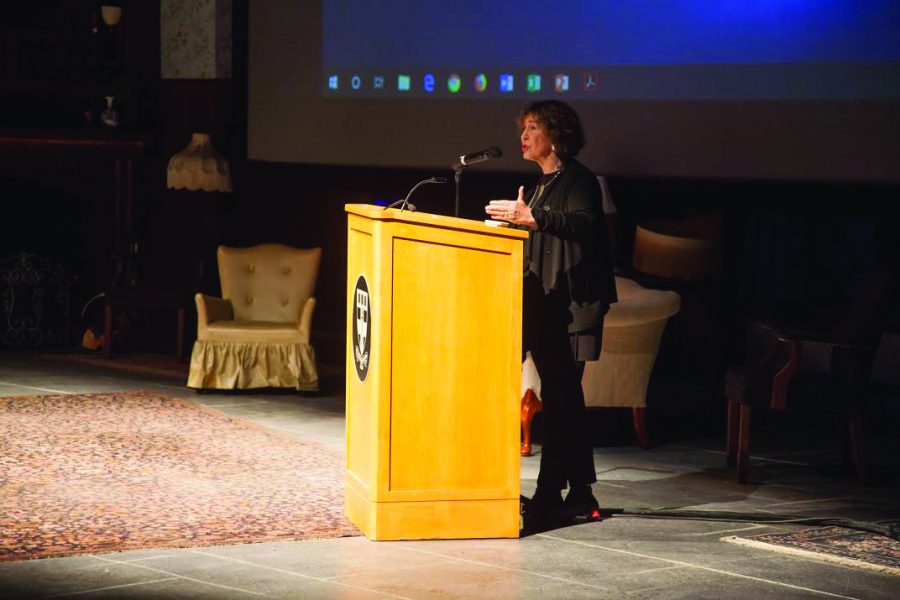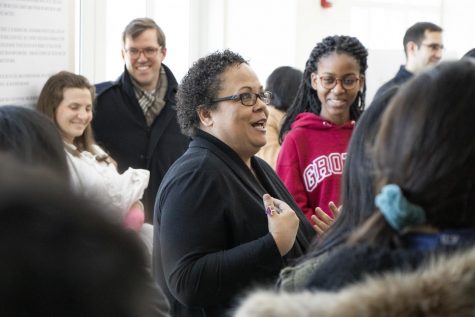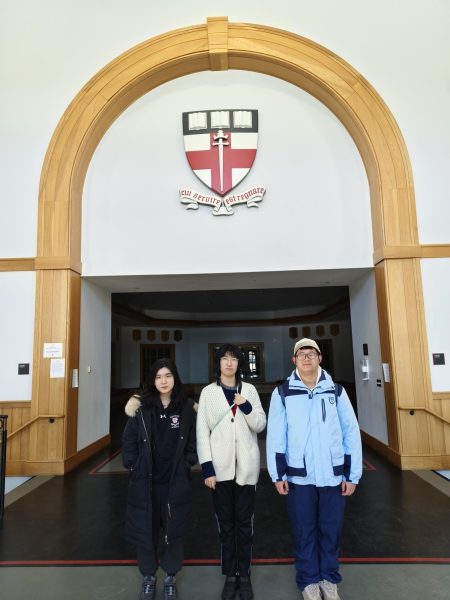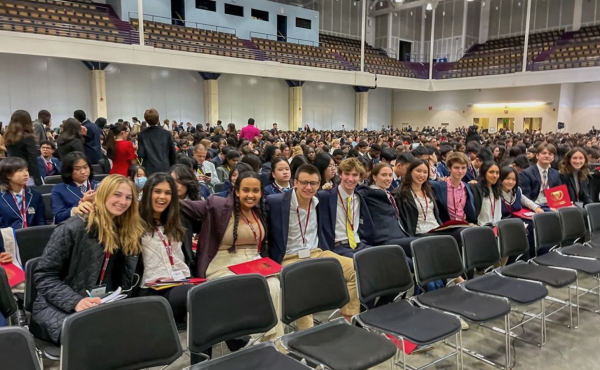A Familiar Writer Arrives: Azar Nafisi’s Circle Talk
Azar Nafisi giving her talk.
To celebrate global perspective and diversity, Groton School held Global Education and Diversity Day on November 5th. A modified Monday schedule, the day began with Azar Nafisi’s Circle Talk, followed by an internationally-inspired lunch and student discussion groups.
Typically, the Diversity and Inclusion (D&I) and Global Education (GE) groups host separate focus days, but they decided to invite Dr. Nafisi for a special joint Global Education and Diversity Day this year. Director of D&I Sravani Sen-Das said, “Since both programs have common goals… we decided to have one speaker so we could make efficient use of time and resources.”
Instead of regular morning chapel, the school piled into the Campbell Performing Arts Center to hear Dr. Nafisi speak. Many students on the Circle were already familiar with Dr. Nafisi and her work: her best-selling book, Reading Lolita in Tehran: A Memoir in Books, was the all-school read this past summer.
Dr. Nafisi was born in Tehran, Iran in 1948. After being educated in England, Switzerland, and the United States, Dr. Nafisi returned to Iran in the late 1980s to teach literature just as the Islamic regime was cracking down. After being expelled from the University of Tehran in 1981 for refusing to wear the mandatory Islamic veil, Dr. Nafisi led study groups in her home for young women. Dr. Nafisi finally left Iran in 1997 to return to the United States, becoming an American citizen in 2008.
Dr. Nafisi was invited to speak after a number of faculty heard her last April at the annual Global Education Benchmark Group conference in Cleveland, Ohio. Mrs. Sen-Das said, “[My colleagues] were impressed by her powerful message about the importance of the arts and of the role of imagination.” Director of GE Nishad Das added, “Naturally, we strive to bring the best speakers to Groton and decided to invite her for our Global Education and Diversity Day… Our goal… is to bring speakers to campus that will provide our students with a global perspective on the state of the world or the happenings in the world.”
Students looked forward to Dr. Nafisi’s talk, especially those who read her acclaimed novel. Eliza Lord ’19 hoped to “learn more about society in a place like Iran.” Sophie Park ’19 wanted, “to hear her talk more about books and how they affect our lives!”
Dr. Nafisi’s Circle Talk did not disappoint those hopes. She opened her speech with a viral video of young Iranian men and women dancing to Pharrell Williams’ “Happy” before elaborating on the importance of imagination, curiosity and empathy, the history of the Islamic Republic of Iran, and her experiences as an American-Iranian woman. Dr. Nafisi urged students to “look with the heart” and remember that people are all the same at their core. She referred back to the “Happy” video as an example: regardless of what government someone lives under, he or she just wants to find and share joy.
Julien Alam ’19, a D&I prefect, said Dr. Nafisi “was amazing” and thought the Circle Talk “resonated well with what we are thinking about on campus at the moment.” Echoing Julien, Andrej Klema ’21 added that Dr. Nafisi was “outstanding and eye-opening.”
Following the Circle Talk and morning classes, the school enjoyed global cuisine for lunch: the Dining Hall prepared Peruvian, Spanish, Moroccan, South African, and Iranian entrées. French desserts were in the Webb Marshall Room, where GE organized several tables with information on the upcoming Global Education Opportunities to Peru, Spain, France, Morocco, and South Africa.
Next, in place of Monday Meetings period, D&I seniors led discussion groups of approximately fifteen students with two teachers. The groups were formed by pairing boys and girls dorms, which were divided into smaller groups, in an effort to make students more comfortable sharing. Groups focused on a variety of topics, including courage, freedom of expression, Islamic feminism, and Western standards of judgment. While students agreed that the discussion groups were beneficial, some felt the conversations were forced and awkward. Andrej said, “[The groups] were a bit big… Having talked with a few of my peers, we would feel a little less self-conscious if the groups were broken up into smaller sub-groups.” Others, however, had smoother group discussions. “Everyone talked, surprisingly,” said Brent Gorton ’19. “We just had a good conversation. It wasn’t an echo chamber… We brought up good points.”
History teacher Stacey Spring, one of the chief organizers of the day, acknowledged that student engagement is dependent on student interest and energy levels, but believes that “it is still good to have the conversations” because they can increase awareness of a multitude of topics. Mrs. Sen-Das agreed, writing, “[Global Education and Diversity Day] was a success, so we hope to use it again in the future, but then again, every year has its own challenges.”












